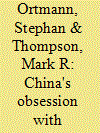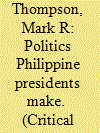|
|
|
Sort Order |
|
|
|
Items / Page
|
|
|
|
|
|
|
| Srl | Item |
| 1 |
ID:
131355


|
|
|
|
|
| Publication |
2014.
|
| Summary/Abstract |
Chinese government officials and academics have shown disproportionate interest in the small city-state of Singapore. The Southeast Asian country with a majority ethnic Chinese population has drawn their attention because it is the only country in the world that combines advanced industrial development with stable one-party rule. Singapore not only seemingly defies Western predictions that modernization will inevitably lead to democracy, but also appears to show that authoritarian regimes may be better suited to achieving societal stability in an Asian context. In particular, the ruling party of the city-state, the People's Action Party, has drawn the attention of conservative Chinese reformists who seek to fill the ideological void that emerged following the decline of Maoist ideology. Reformers in China also derive practical governance lessons from Singapore about fighting corruption, increasing professionalization, and improving responsiveness within the party-state. As such, political learning from the Singapore model must be seen as part of the ongoing process of transformation of the Chinese Communist Party. As a consequence of this learning process, Chinese reformers are using lessons from the Singaporean model as arguments in their efforts to bolster the ideological foundations and strengthen the governance capacity of one-party rule, thus reducing pressures for democratization.
|
|
|
|
|
|
|
|
|
|
|
|
|
|
|
|
| 2 |
ID:
050231


|
|
|
|
|
| Publication |
London, Routledge, 2004.
|
| Description |
180p.
|
| Standard Number |
0415304156
|
|
|
|
|
|
|
|
|
|
|
|
Copies: C:1/I:0,R:0,Q:0
Circulation
| Accession# | Call# | Current Location | Status | Policy | Location |
| 047564 | 321.8095/THO 047564 | Main | On Shelf | General | |
|
|
|
|
| 3 |
ID:
167067


|
|
|
|
|
| Summary/Abstract |
Singapore exemplifies what China strives for: resilient authoritarianism despite advanced development with good governance and political stability. But lessons Chinese observers draw from the Southeast Asian city-state have been selective, leading to misconceptions. We focus on three key areas in which Chinese observers claim inspiration from the “Singapore model.” The first, Singapore's “Asian values” discourse which is seen to provide an ideological defense of non-democratic rule, overestimates the impact of top-down conservative culturalism while underestimating the difficulty of propagating Confucianism in officially still communist China. Second, while elections in Singapore are seen to bolster the ruling People Action Party's legitimacy in Singapore, they have been implemented to such a limited extent in China that any legitimation gain is unlikely. Finally, the chief lesson derived from Singapore's fight against corruption, the importance of a committed leadership, ignores the importance of the rule of law in Singapore, a legacy of colonialism very different from China's post-totalitarian trajectory.
|
|
|
|
|
|
|
|
|
|
|
|
|
|
|
|
| 4 |
ID:
132901


|
|
|
|
|
| Publication |
2014.
|
| Summary/Abstract |
In political systems with a powerful chief executive, such as in the Philippines, an essential element in the analysis of politics is a clear understanding of the impact of presidential politics. Two analytical theories have tried to understand this phenomenon: (1) a voluntarist, actor-centered, presidential-style approach, and (2') a structuralist, patronage-based approach. This article shows that neither approach provides a satisfactory account of the country's presidency. A more useful approach, the author argues, is the relational one (leveloped by US. political scientist Stephen Skowronek to analyze the presidency in the United States. Skowronek studies whether presidents attempt to govern in accordance with, or in opposition to, an existing presidential regime-a prevailing set of ideas, interests, and institutional arrangements. This approach allows for the assessment of the choices presidents make within structural constraints while differentiating the performance of presidents from their role as patron-in-chief. In order to apply this theory to the Philippine presidency however, it must be modi?ed to take into account campaign narratives, strategic groups, and institutional instability' Post- Marcos presidents, the author concludes, can best be evaluated based on how close their association was, or is, with the dominant reformist regime, which employs a narrative of good governance and democratization.
|
|
|
|
|
|
|
|
|
|
|
|
|
|
|
|
| 5 |
ID:
147253


|
|
|
|
|
| Summary/Abstract |
Duterte appeals to those in Philippine society yearning for the reimposition of ‘discipline’ in the spirit of the former dictator Marcos
|
|
|
|
|
|
|
|
|
|
|
|
|
|
|
|
|
|
|
|
|